
While many canon law experts believe the norms in "Vos Estis Lux Mundi" represent a turning point in the church's efforts to hold bishops accountable, others believe much could be improved upon, including greater transparency on disclosing when investigations are taking place, the need to mandate the use of lay experts, and clarity on the status of bishops removed from office following an investigation. (Unsplash/Markus Winkler)
Two years ago this month, Pope Francis issued a sweeping new church law on bishop accountability, establishing a global system for investigation allegations against bishops of abuse or its cover-up.
Known as Vos Estis Lux Mundi ("You Are the Light of the World"), the norms encourage — but do not mandate — the involvement of lay experts in the process of investigating allegations against bishops. When it was signed into law, Vos Estis was adopted for a three-year period "ad experimentum."
To date, there are at least six known authorized Vos Estis investigations into U.S. bishops by the Vatican. Since taking effect, several other bishops have also come under investigation, although the Vatican has used different processes for handling their cases.
Chieko Noguchi, a spokeswoman for the U.S. bishops' conference, told NCR that "Since the [Vos Estis] model derives its authority from the Holy See, the Conference does not have an oversight role in the process."
While many canon law experts believe the norms in Vos Estis represent a turning point in the church's efforts to hold bishops accountable, others believe much could be improved upon, including greater transparency on disclosing when investigations are taking place, the need to mandate the use of lay experts, and clarity on the status of bishops removed from office following an investigation.
The need for lay involvement: A tale of two investigations
The Vatican received its first allegations of sexual abuse against Bishop Joseph Hart of Cheyenne, Wyoming, over 10 years ago. When Bishop Steven Biegler arrived on the scene in 2017, he began to review the files related to his predecessor, eventually reopening an investigation into Hart and vowing to the alleged victims that he would do everything in his power to hold the retired bishop accountable.
Biegler made good that promise: In 2018, the allegations were investigated by lay professionals and deemed "credible and substantiated."
In Rome, however, a very different story played out.
Pope Francis approved a penal process for Hart in 2019 and eventually tapped a U.S. bishop delegate to handle the investigation. Yet in January of this year, the Vatican's Congregation for the Doctrine of the Faith determined that the allegations could not be proven, and the case was closed with a rebuke to Hart for "flagrant" behavior.
Biegler was frustrated by the outcome. Reflecting back on the difference between Cheyenne's diocesan investigation and the one managed by the Vatican, he points to one critical difference: the involvement of outside professional lay experts.
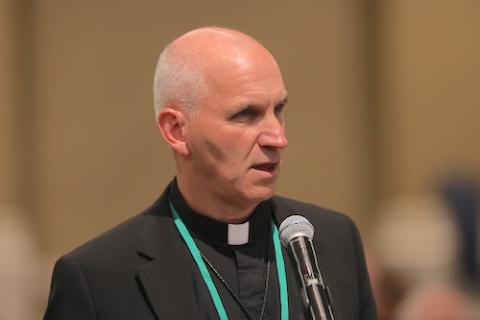
Bishop Steven Biegler of Cheyenne, Wyoming, at the spring general assembly of the U.S. Conference of Catholic Bishops in Baltimore June 11, 2019 (CNS/Bob Roller)
While Biegler's investigation into Hart began two years before Vos Estis had been promulgated, he believes the way the case was handled illustrates what works well — and what does not — when it comes to the process of investigating bishops.
When the new investigation into Hart began, the Diocese of Cheynne hired a lawyer who had previously investigated over 200 allegations of sexual abuse in the United States, including in many dioceses or archdioceses.
"He knew how to conduct a forensic interview, and he understood how abuse victims recount their experience," Biegler said of the lawyer's expertise. In addition, the abuse accusations were reviewed by the diocese's judicial vicar and its Diocean Review Board, which includes the vicar general and three lay men and three lay women with professional backgrounds in law enforcement (including a judge), school administration, psychology and psychotherapy, and pediatrics.
By contrast, the Holy See investigation was managed by a U.S. bishop with a degree in canon law, who served as the Congregation for the Doctrine of the Faith's delegate, and two priests with canon law degrees as assessors.
No outside experts were invited to examine the allegations, and Biegler told NCR that when the primary victim in the case was finally interviewed, it was only after his urging. The interview was conducted by a priest canon lawyer.
In March 2020, Biegler wrote to the bishop delegate encouraging him to consult outside lay experts and forwarded along the biographies of Teresa Kettelkamp, who serves on the Vatican's Pontifical Commission for the Protection of Minors and is a former Illinois state police colonel, and Kathleen McChesney, a former FBI executive assistant and the first person to lead the U.S. bishops' Office of Child and Youth Protection.
After eight months had passed without a response from the bishop delegate, Biegler said he again inquired to see if any outside experts had been consulted.
The bishop delegate "simply stated that he relied on the civil, legal, psychological, canonical reports submitted in the case," Biegler recalled.
Having received no indication of outside consultation, Biegler said he shared his concerns with an official at the Congregation for the Doctrine of the Faith who told him, "I will send your message forward to the superiors and you will receive a reply from them shortly."
"As of today, I have received no reply," Biegler said.
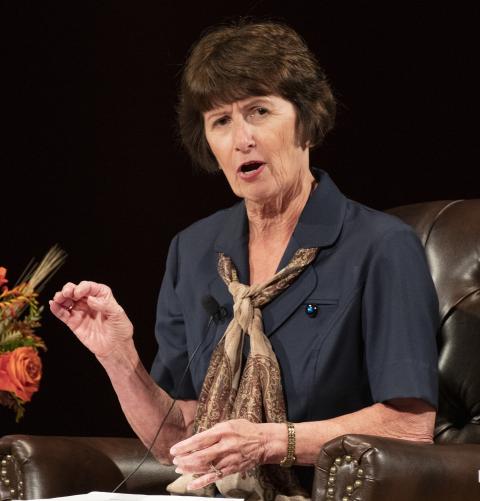
Kathleen McChesney, former FBI executive assistant director who investigated abuse victim allegations, speaks during a panel discussion titled "The Church Crisis: Where Are We Now?" at the University of Notre Dame in Indiana Sept. 25, 2019. (CNS/Barbara Johnston/Courtesy of University of Notre Dame)
Despite his criticisms of the way the Hart case was handled, Biegler told NCR he believes Vos Estis is a "a great step forward" and put the church on the right path with bishop accountability.
"More needs to be done about the training of those doing investigations and others who deal with these cases, and the involvement of lay experts needs to be strengthened," he said.
Following the Holy See's decision on the Hart case, Biegler held two meetings with his diocesan review board members whom he described as "frustrated" by the result. During those meetings, he says "the competency question came up huge there." The plan is to send the Vatican comments in hopes that they will be received by those looking to improve upon the procedure going forward.
"It's not merely about the Hart case," said Biegler. "It's about how we can move the needle on the process. That's my goal."
Vos Estis in action around the country
Across the country, several other Vos Estis investigations continue to take place with varying degrees of transparency.
Last month, Pope Francis accepted the resignation of Bishop Michael Hoeppner of Crookston, Minnesota, making him the first U.S. bishop to effectively lose his job as a result of a Vos Estis investigation.
Two days later, Hoeppner held a farewell Mass in the diocese. While he apologized "for any failures of mine in governing as bishop," others questioned why, after losing his job for allegations of covering up abuse, he was given any sort of platform for continued public ministry.
Under Vos Estis, once an allegation against a bishop is received, it falls to the metropolitan archbishop of a province to oversee the investigation. In the Hoeppner case, it fell to Archbishop Bernard Hebda of St. Paul-Minneapolis. Two lay experts reviewed the findings and determined the investigation was "conducted in a fair and impartial manner."
Following Hoeppner's resignation, the Survivors Network of Those Abused By Priests (SNAP) said they hoped the Vos Estis investigation would lead to greater transparency from the Vatican.
"We are glad that one less diocese in the U.S. is led by a prelate who put their reputation over the protection of children," said executive director Zach Hiner in a statement. "We hope that the results of the investigation will still be released and that the Vatican will not use this resignation as an excuse to keep the facts from being made public."
Advertisement
In January 2020, the Vatican ordered an investigation of Bishop Nicholas DiMarzio of Brooklyn following allegations against DiMarzio by a former altar boy when DiMarzio was a priest in the Archdiocese of Newark, New Jersey.
As the metropolitan archbishop, Cardinal Timothy Dolan of New York was tasked with overseeing the investigation. The archdiocese announced it had hired former FBI Director Louis Freeh's consulting group to conduct the investigation.
Joseph Zwilling, the director of communications for the New York Archdiocese, told NCR last month that the investigation had been completed and the "matter is now in the hands of the Holy See."
Dolan is also heading another Vos Estis investigation into allegations against retired Bishop Howard Hubbard of Albany, New York.
"The canonical procedure has been put on hold until the civil cases [against him] have been concluded," said Mary DeTurris Poust, director of communications for the Albany Diocese, in a statement to NCR. "In the meantime, Bishop Hubbard, who continues to maintain his innocence, is not serving in active ministry and has not been since the initial lawsuits were filed in 2019."
In February, Bishop John Brungardt of Dodge City, Kansas, stepped aside from ministry following allegations he abused a minor. The Kansas Bureau of Investigation, a division of the state's Office of the Attorney General, is conducting the investigation, which has also triggered a canonical investigation under Vos Estis.
Anita McSorley, a communications officer for the Archdiocese of Kansas City, Kansas, confirmed to NCR that Kansas City Archbishop Joseph Naumann was overseeing that investigation.
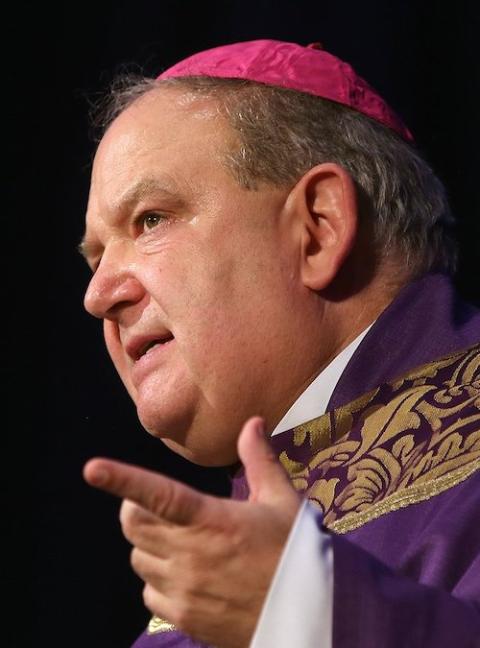
Archbishop Bernard Hebda of St. Paul and Minneapolis, Nov. 12, 2019. (CNS/Bob Roller)
Last November, Bishop Oscar Cantú of San Jose, California, confirmed reports that he is also under investigation in his former diocese of Las Cruces, New Mexico. While Cantu said he would comply with the Vos Estis investigation, a spokesperson for the diocese of San Jose did not respond to NCR's request for comment.
In March 2020, Thomas Johnson, a court-appointed official in the Archdiocese of St. Paul and Minneapolis, went public detailing the Vatican's Congregation for Bishops' failures to comply with Vos Estis in regard to former Archbishop John Nienstedt. After a review of his case was sent to the Vatican by current Archbishop Bernard Hebda, the Vatican failed to make a determination on the case in 30 days, which is the requirement outlined in Vos Estis.
More than a year after the case was sent to the Vatican, Victoria Newcome Johnson, who succeeded her late husband in the role as the court-appointed official, told NCR that she has received confirmation that a Vos Estis investigation is now underway by a bishop delegate whose identity remains unknown to her.
Newcome Johnson said that Vos Estis has raised the bar for accountability and, in some cases, such as the Hoeppner case, the involvement of seasoned outside investigators has proven critical. Yet she also raised questions as to why the law does not require bishops to step aside while they are under investigation and believes there is a lack of transparency when it comes to knowing whether an investigation is taking place.
"This is especially a disservice to victim survivors," she said.
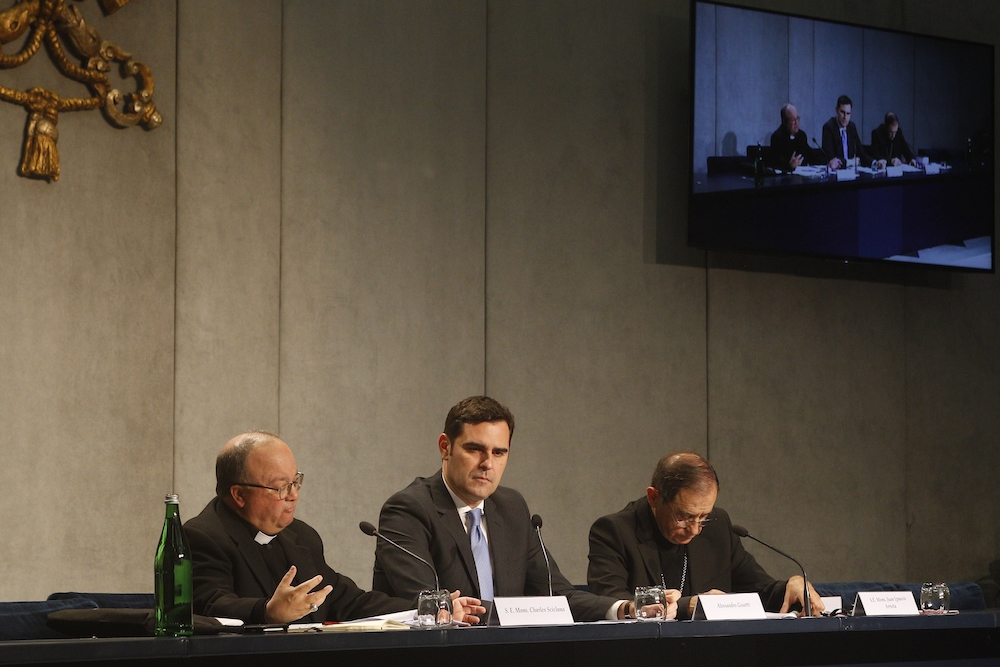
Archbishop Charles Scicluna of Malta and Bishop Juan Ignacio Arrieta, secretary of the Pontifical Council for Legislative Texts, together with Alessandro Gisotti of the Vatican press office, present Pope Francis' document on abuse norms, "Vos Estis Lux Mundi" ("You Are the Light of the World") at the Vatican May 9, 2019. (CNS/Robert Duncan)
'What needs to be changed, what needs to be retained and what needs to be eliminated'
While some Vos Estis cases come about due to civil or criminal charges made against a bishop that then trigger a canonical investigation, others are made public by media reports. No reports of Vos Estis investigations have come directly from the Holy See.
Fr. Thomas E. Cronkleton Jr., judicial vicar of the Cheyenne Diocese, told NCR that one of the reasons the document issued on Francis' own initiative (motu proprio) does not mandate that all investigations be made public is that there are "different political situations in the world," and there are some places "where the church is in a difficult spot because of the government."
While some have criticized Vos Estis for not requiring that all investigations and their status be announced, Cronkleton said that one of the reasons for the delay in making the investigation public could be that "once you say someone is accused, it's hard to back away from that even if they're exonerated."
Mercy Sr. Sharon Euart, a former associate general secretary of the U.S. bishops' conference and a noted canonist, concurred, saying the church has a responsibility to maintain the presumption of innocence for the accused.
Euart, now executive director of the Resource Center for Religious Institutes, said the investigation should be announced "after the allegation has come to the nuncio or metropolitan and sent to Rome and Rome has then determined that it will be investigated."
Two years after its implementation, Euart described Vos Estis as "valuable" but, like most church laws, one that could be improved upon.
"The major focus of Vos Estis and what needs to be affirmed is that it does focus on child protection and it's another mechanism in the church that Pope Francis has initiated to address child protection at a level that it had not been addressed before," she said. "However, we're still in the stage of trying to figure out how to use it best."
One needed clarification, she says, is how to handle allegations against individuals who are now bishops but in which the allegation was made from their time as priest.
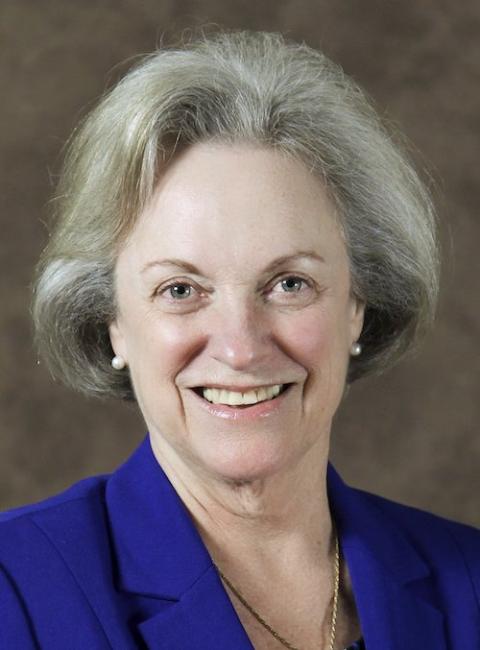
Canon lawyer Mercy Sr. Sharon Euart is a former associate general secretary of the U.S. Conference of Catholic Bishops and now the executive coordinator of the Resource Center for Religious Institutes. (CNS/Courtesy of Sharon Euart)
Euart also suggests that the Vatican consider producing a similar document as they did with the Vademecum, which offers a step-by-step procedural outline by handling allegations of abuse against priests.
For Biegler, the greatest area in need of improvement revolves around the competency of key participants, the involvement of lay experts in the investigation and the need for laity to be involved in judging cases that are handled by the Holy See.
"Vos Estis should require that those involved in conducting interviews, evaluating investigative reports and administering justice must have specialized training in order to participate in a competent manner," he told NCR. "This includes investigators, advocates, auditors, bishop delegates, assessors, judges, prosecutors, the defense and the Metropolitan responsible for a case."
In addition, he would like for the Holy See "to make use of a body of experts similar to the diocesan review boards" that are used in the United States.
"In the case of Bishop Hart, the bishop delegate chose not to make use of qualified experts," said Biegler. "He could have chosen to do additional investigation or to consult experts. Since he did not, it is evident that the language is not strong enough. In the end, the process was inadequate, and the credibility of the church was compromised."
Over the next year, discussion will continue both in the United States and Rome about what to do as the document reaches its expiration date.
Euart told NCR that the review process for the end of the experimental period "normally would involve some type of consultation, especially with dioceses, bishops and religious institutes that utilized the procedures in the motu proprio on what needs to be changed, what needs to be retained and what needs to be eliminated."
She would like to see "a global consultation" to take stock of the experience of the last two years and believes that a modification should involve a joint effort by the Congregation for Bishops, Congregation for Institutes of Consecrated Life and Societies of Apostolic Life, and the Congregation for the Doctrine of the Faith.
"I think the document is valuable," says Euart. "But, I think it needs to be modified."

Mercy Sr. Sharon Euart: "The major focus of Vos Estis and what needs to be affirmed is that it does focus on child protection and it's another mechanism in the church that Pope Francis has initiated to address child protection at a level that it had not been addressed before. However, we're still in the stage of trying to figure out how to use it best." (Unsplash/Piron Guillaume)







